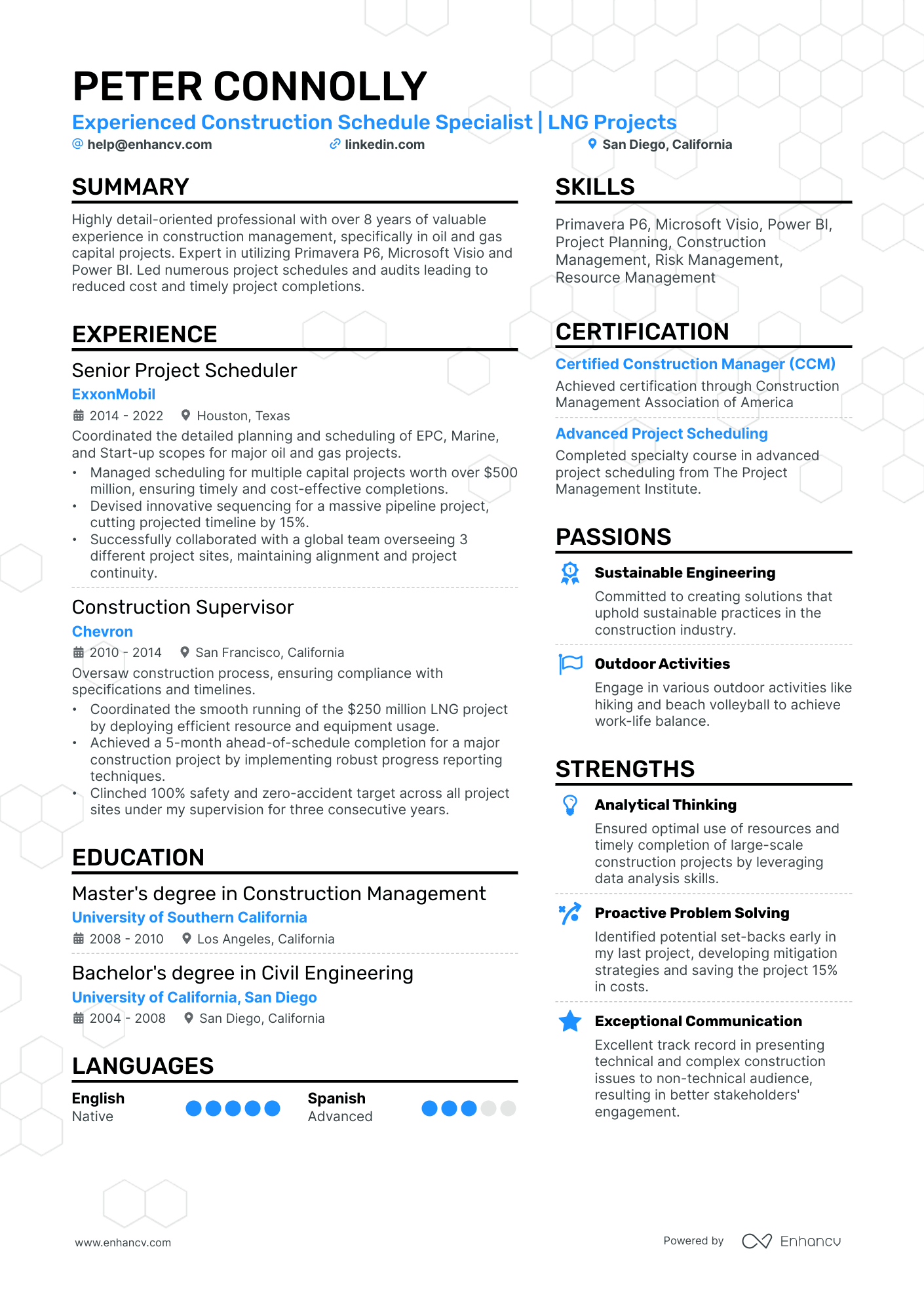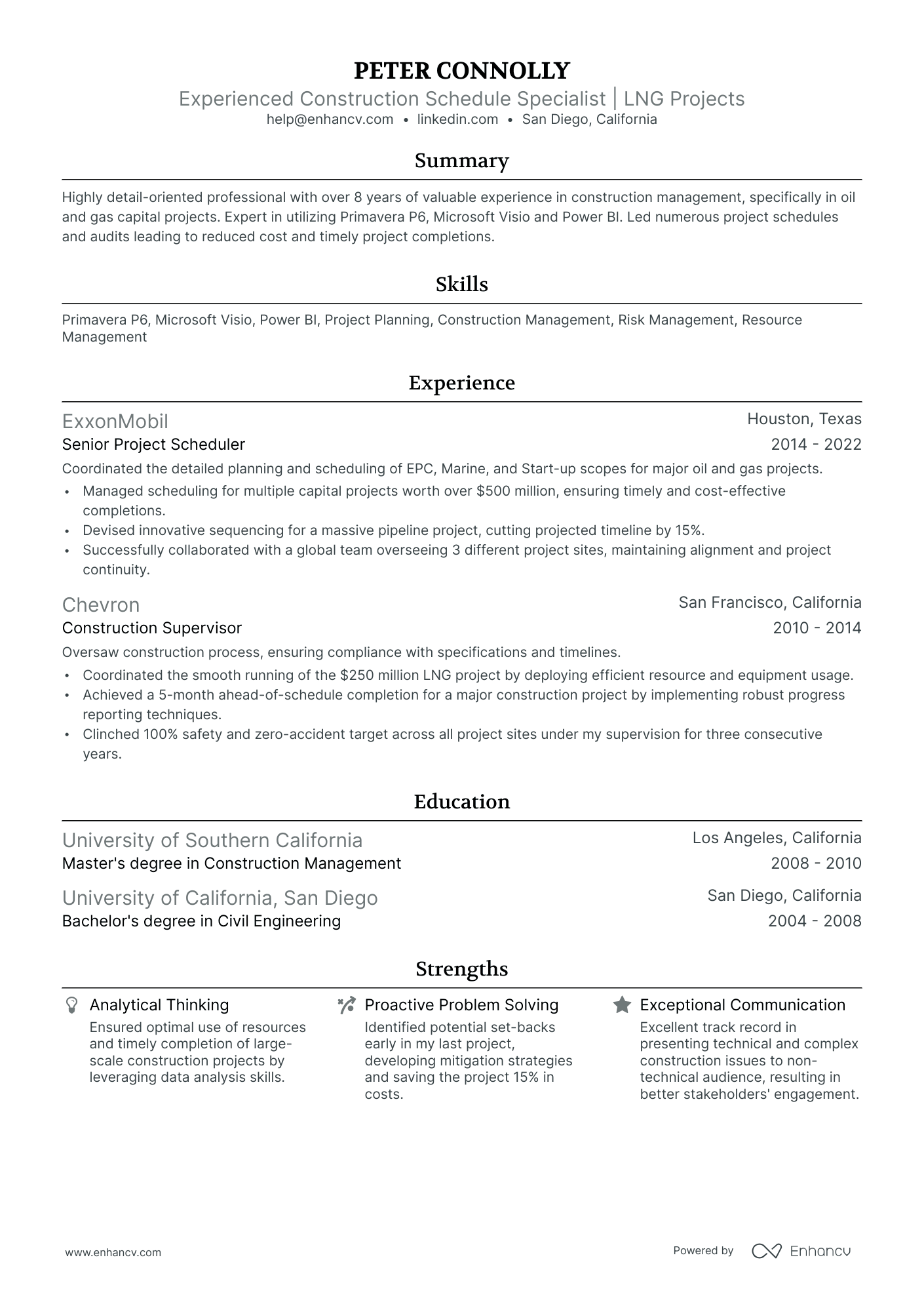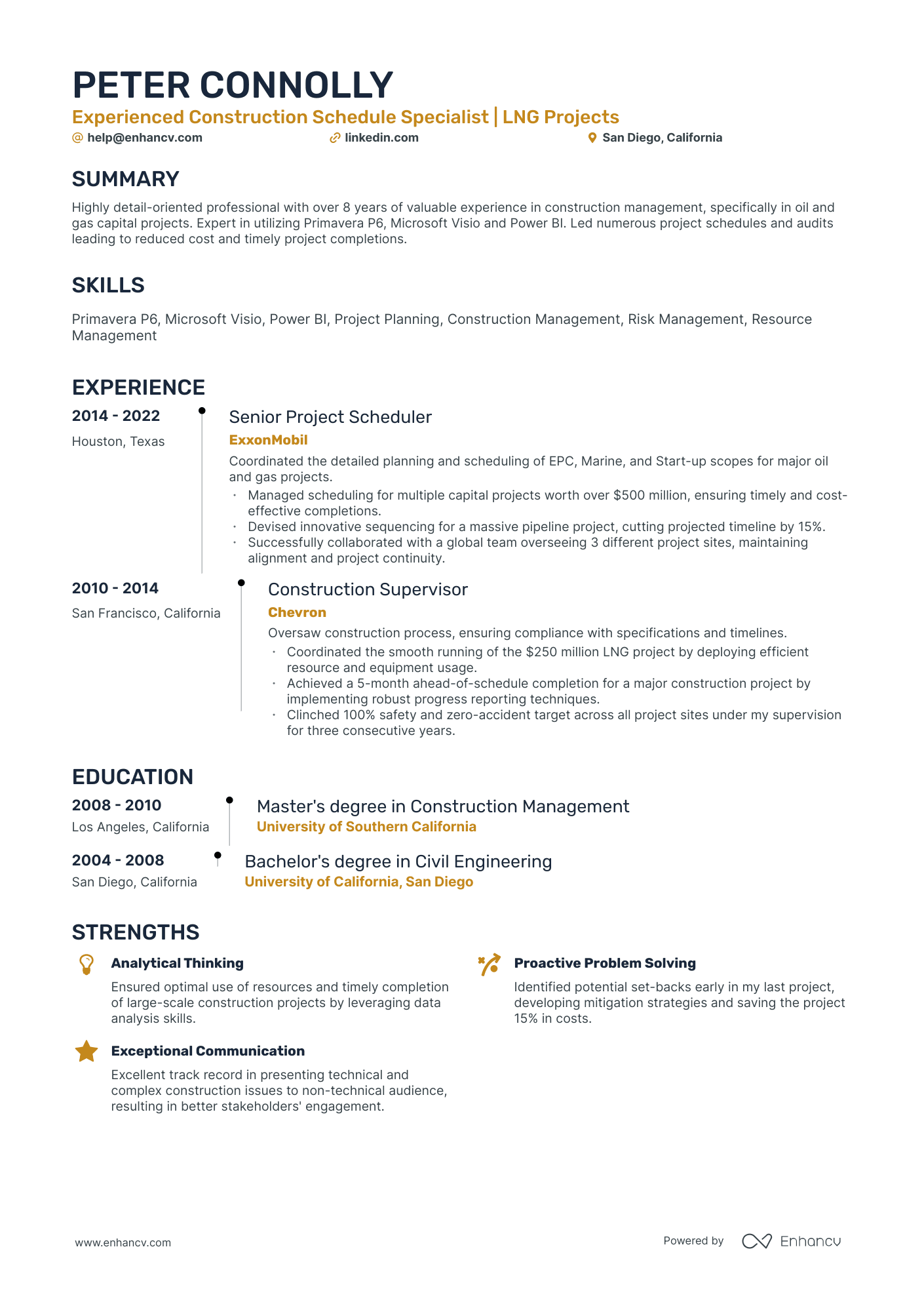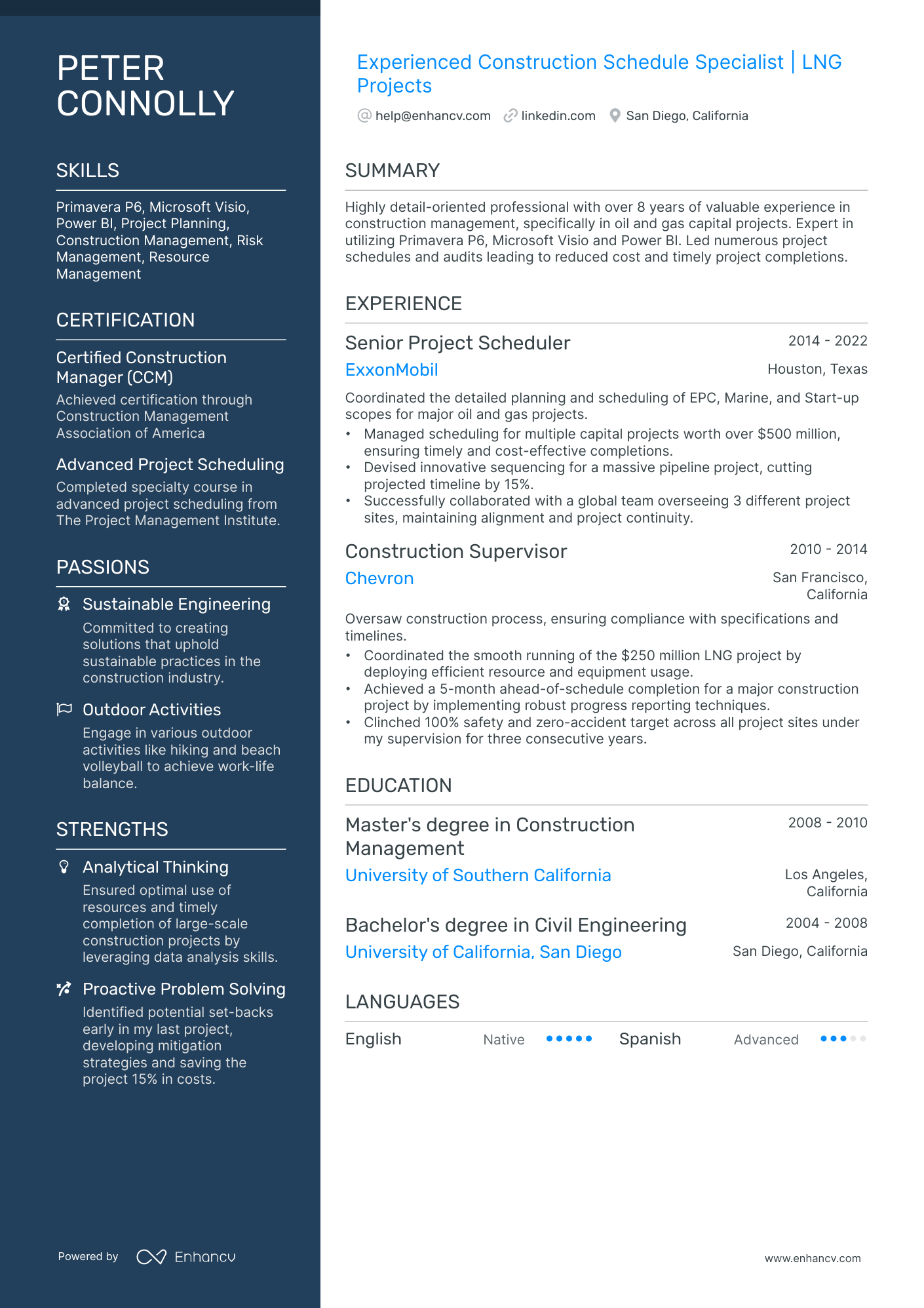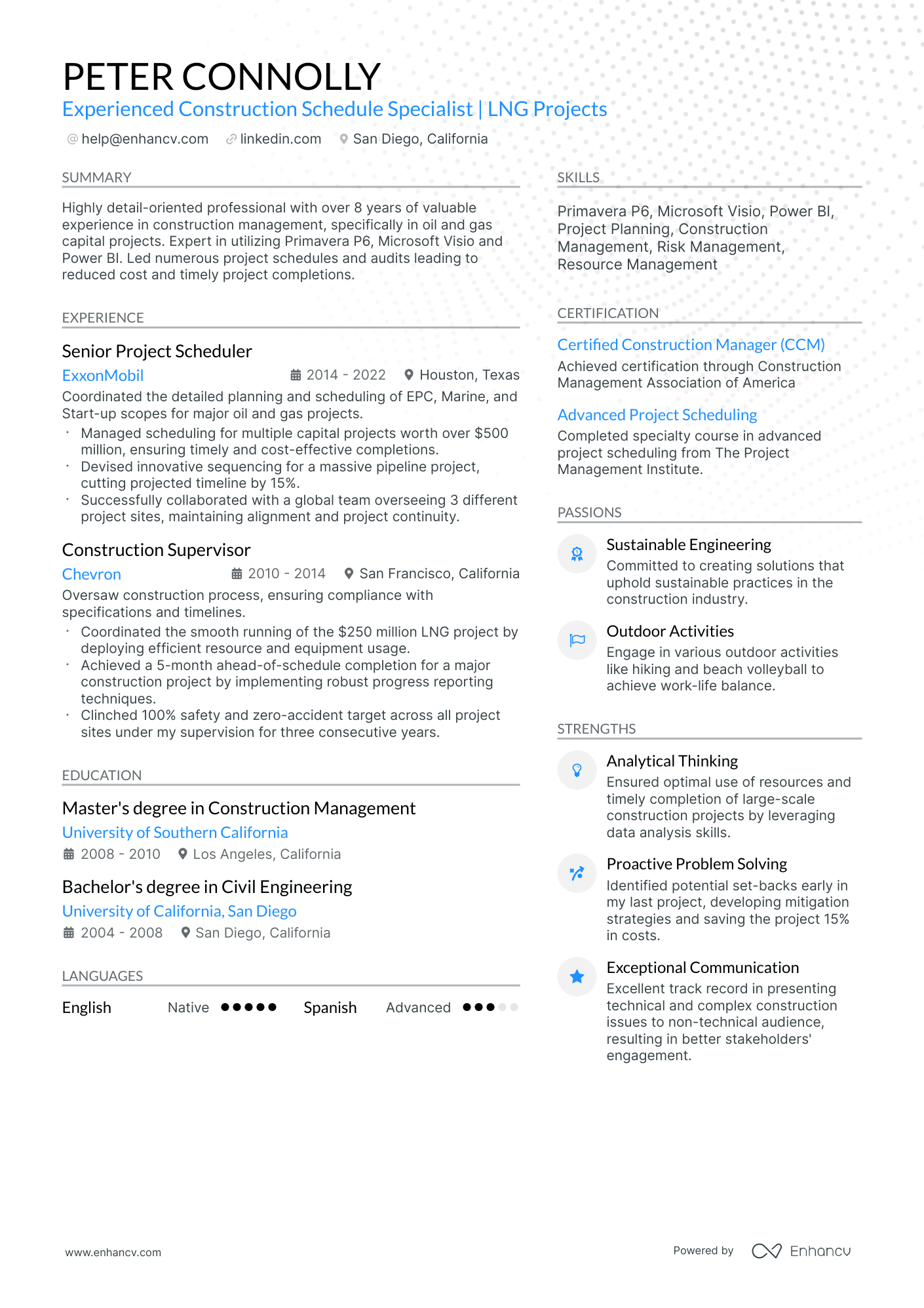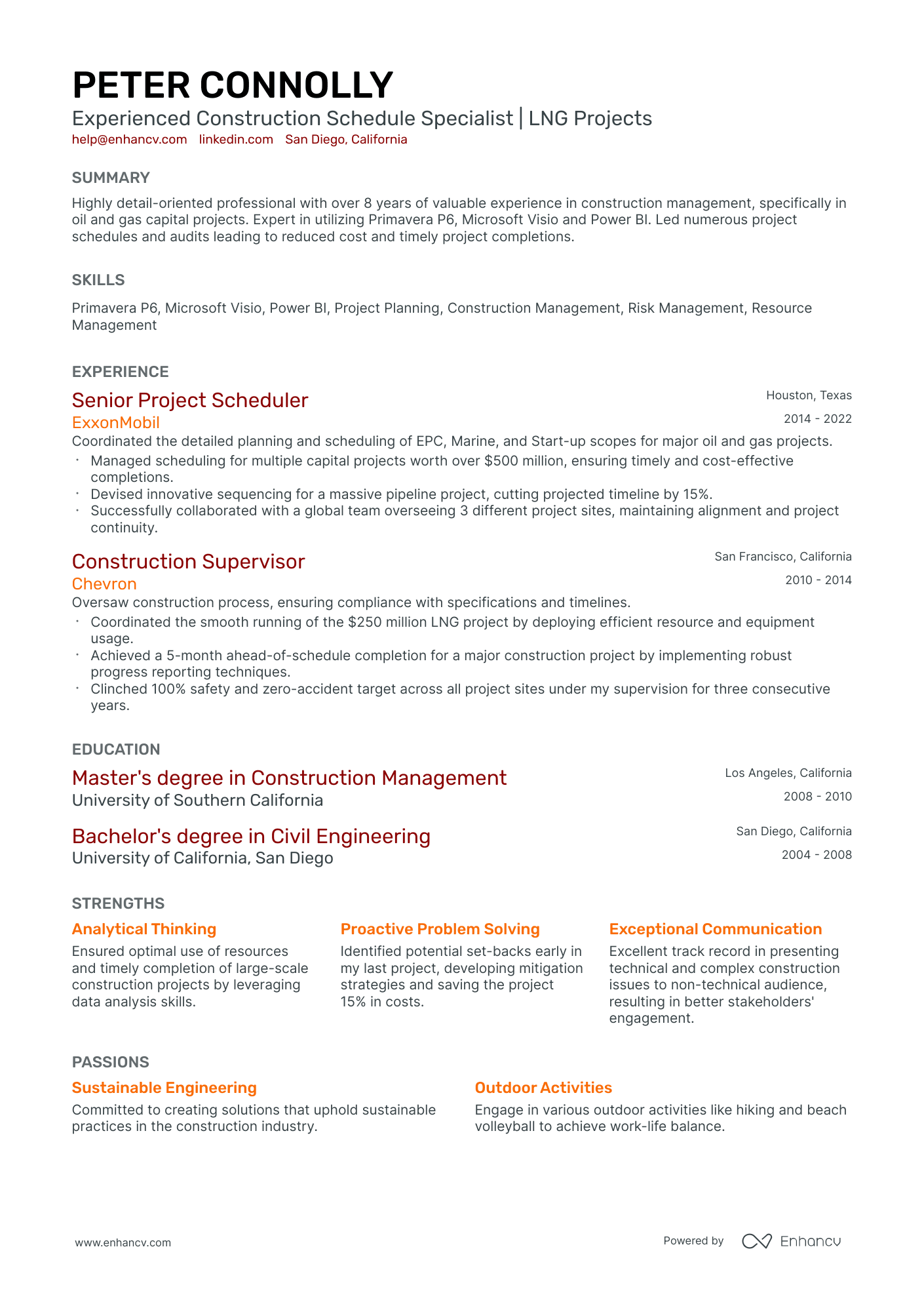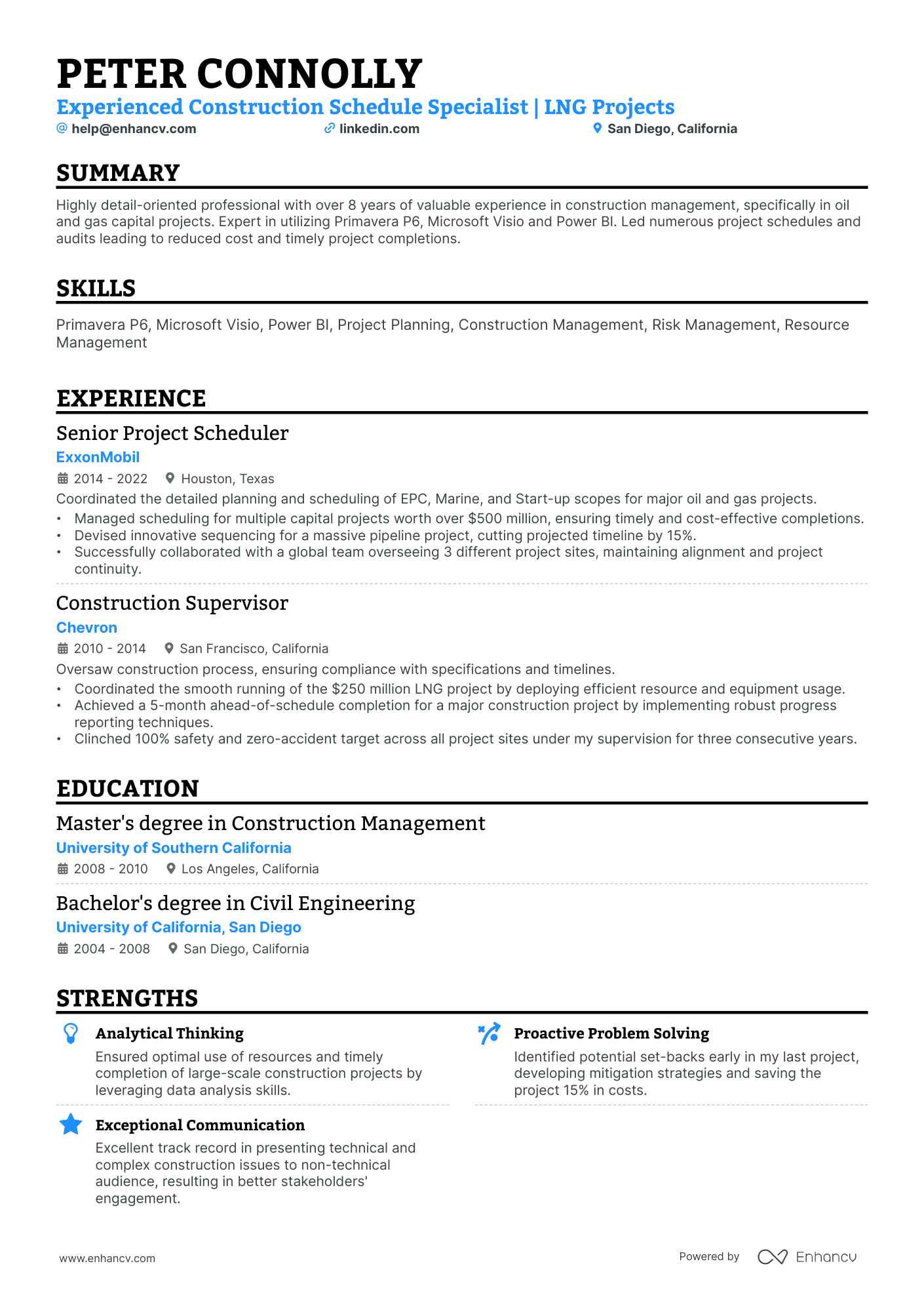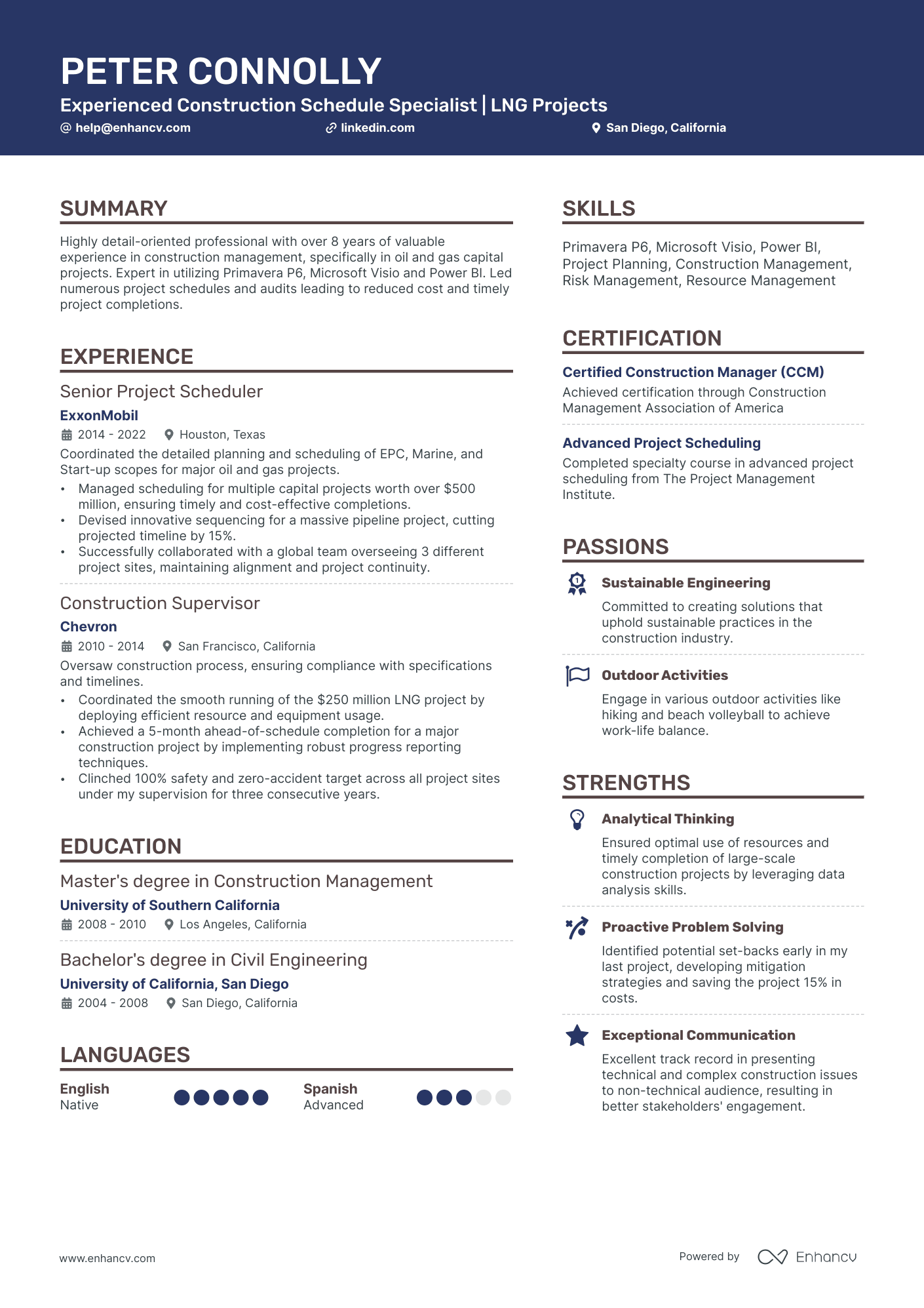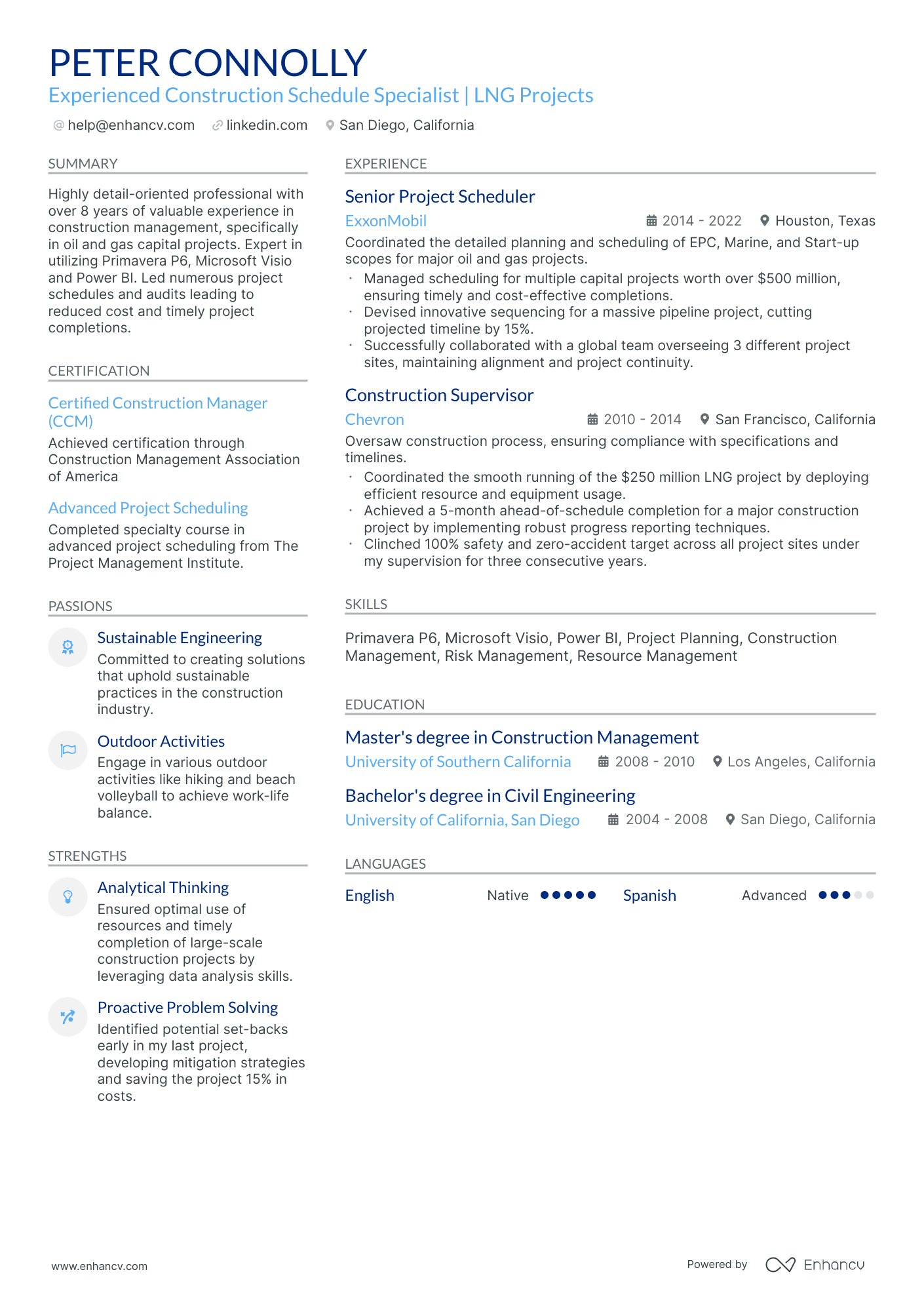Schedulers often struggle with demonstrating their ability to handle complex scheduling software and manage multiple tasks simultaneously in a concise way on their resume. Our guide can assist by providing specific keywords and phrasing suggestions that effectively highlight these skills, as well as offering examples of how to showcase relevant software proficiency and multitasking capabilities in the work experience section.
Stay tuned for more ideas on how to write your scheduler resume:
- Find different scheduler resume examples to serve as inspiration to your professional presentation.
- How to use the summary or objective to highlight your career achievements.
- How to create the experience section to tell your story.
- Must have certificates and what to include in the education section of your resume.
Recommended reads:
crafting an impeccable scheduler resume format in four steps
Your scheduler resume format should be both strategic and reader-friendly. Here's a concise guide to help you achieve that:
- Choose a format that aligns with the job's requirements. If your expertise is directly relevant, the reverse-chronological format is ideal. If you're focusing more on skills, consider the functional or hybrid formats.
- Header: Ensure it's populated with accurate contact details and any relevant portfolio links.
- Length: A one-page resume is standard, but if you have extensive experience, extending to two pages is acceptable.
- File type: To maintain formatting consistency, always opt for PDF.
Targeting Canada? – Keep in mind their resume layout may differ from others.
Upload your resume
Drop your resume here or choose a file. PDF & DOCX only. Max 2MB file size.
Pro tip
Consider incorporating design elements like icons or charts to enhance your resume's visual appeal and readability. But remember, the key is subtlety; don't let design overshadow content.
Recruiters' top picks for scheduler resume sections:
- A header with essential contact details and a headline showcasing your current role.
- A summary or objective that aligns your standout expertise with the role's demands.
- An experience section that delves into your key responsibilities and achievements.
- A skills section that intertwines job requirements with your unique capabilities.
- Education and certifications sections that bolster your professional credentials.
What recruiters want to see on your resume:
- Experience with scheduling software: Recruiters look for experience with specific tools, such as Microsoft Project, Primavera P6, or any other project management systems.
- Project management skills: The ability to manage multiple projects at once, track progress, and handle adjustments is crucial in a scheduler role.
- Time management and organization: schedulers need to be highly organized and good at managing their time, as they will often be juggling multiple schedules and deadlines.
- Problem-solving skills: The ability to quickly identify and resolve scheduling conflicts or issues is a valued skill for a scheduler.
- Communication skills: schedulers often need to coordinate among various parties, so being able to communicate effectively is important.
Recommended reads:
Optimizing your scheduler resume experience section
Your resume's experience section should resonate with your accomplishments while aligning with the job's demands. Here's how:
- Highlight significant career moments, and back them up with relevant skills.
- Analyze the job description to address both basic and advanced requirements.
- If you have unrelated roles, consider a separate section, but emphasize transferable skills.
- Avoid listing roles from over a decade ago unless they showcase your trajectory, especially for senior roles.
- Illustrate how your contributions enhanced the team or company, linking challenges to solutions.
Review how seasoned scheduler professionals have crafted their experience sections, emphasizing their contributions.
- Collaborated with cross-functional teams to develop and implement optimized scheduling strategies resulting in a 20% reduction in production downtime.
- Utilized advanced scheduling software to streamline operations and improve overall efficiency, achieving a 15% increase in productivity.
- Coordinated complex logistics for multiple projects simultaneously, ensuring timely delivery and customer satisfaction.
- Managed and maintained a comprehensive scheduling system for a team of 50+ employees, ensuring optimal resource allocation and minimizing conflicts.
- Implemented a new scheduling methodology, reducing overtime costs by 30% while maintaining high service levels.
- Developed and presented weekly reports on scheduling performance, identifying areas for improvement and implementing corrective measures.
- Optimized the scheduling process by implementing an automated system, reducing manual errors and eliminating double bookings.
- Collaborated with suppliers to negotiate favorable delivery schedules, resulting in a 10% reduction in transportation costs.
- Managed emergency schedule changes effectively, ensuring minimal disruption to operations and maintaining customer satisfaction.
- Led a team of schedulers in coordinating complex schedules for a large-scale construction project, ensuring timely completion and adherence to budget.
- Developed and implemented a resource allocation strategy resulting in a 25% reduction in idle time and improved project efficiency.
- Worked closely with subcontractors and suppliers to resolve scheduling conflicts and ensure smooth project execution.
- Developed and maintained a master production schedule, optimizing inventory levels and reducing stockouts by 15%.
- Implemented lean manufacturing principles in the scheduling process, resulting in a 20% reduction in lead times and improved on-time delivery.
- Coordinated with sales and marketing teams to align production schedules with customer demand, reducing order fulfillment time by 30%.
- Managed the scheduling of maintenance activities, ensuring minimal impact on production and maximizing equipment uptime.
- Implemented preventive maintenance scheduling, reducing equipment failures by 25% and improving operational reliability.
- Collaborated with engineering team to optimize maintenance schedules resulting in a 15% reduction in overall maintenance costs.
- Developed and implemented an advanced scheduling algorithm, reducing production lead times by 30% while maintaining high quality standards.
- Collaborated with sales team to forecast demand and adjust production schedules accordingly, resulting in a 20% increase in on-time delivery.
- Managed scheduling for multi-site operations, coordinating resources and optimizing production plans across multiple locations.
- Implemented a centralized scheduling system, improving communication and coordination among different departments, resulting in a 25% reduction in scheduling conflicts.
- Developed key performance indicators (KPIs) to measure scheduling efficiency and continuously monitored and improved performance based on data analysis.
- Collaborated with project managers to create detailed project schedules, ensuring timely completion and avoiding delays.
- Coordinated the scheduling of customer installations, resulting in a 20% reduction in wait times and improved customer satisfaction.
- Utilized advanced scheduling software to optimize technician routes, reducing travel time by 15% and increasing productivity.
- Developed and implemented a prioritization system for urgent service requests, resulting in a 30% decrease in response time for critical issues.
- Manage and oversee the scheduling department, ensuring efficient and effective allocation of resources to meet project deadlines.
- Implement process improvements in the scheduling system, resulting in a 20% reduction in scheduling errors and improved accuracy.
- Collaborate with project managers to develop and maintain project schedules, tracking progress and identifying potential risks.
The following content includes information from "O*NET OnLine" by the U.S. Department of Labor, Employment and Training Administration (USDOL/ETA). Used under the CC BY 4.0 license. The data represents the top responsibilities present on the task lists for scheduler professionals.
Top Responsibilities for Scheduler:
- Maintain and develop positive business relationships with a customer's key personnel involved in, or directly relevant to, a logistics activity.
- Develop an understanding of customers' needs and take actions to ensure that such needs are met.
- Manage subcontractor activities, reviewing proposals, developing performance specifications, and serving as liaisons between subcontractors and organizations.
- Develop proposals that include documentation for estimates.
- Review logistics performance with customers against targets, benchmarks, and service agreements.
- Direct availability and allocation of materials, supplies, and finished products.
- Redesign the movement of goods to maximize value and minimize costs.
- Explain proposed solutions to customers, management, or other interested parties through written proposals and oral presentations.
- Direct team activities, establishing task priorities, scheduling and tracking work assignments, providing guidance, and ensuring the availability of resources.
- Perform managerial duties such as hiring and training employees and overseeing facility needs or requirements.
Quantifying impact on your resume
<ul>
Lacking experience? Here's what to do.
Candidates with limited experience often fall into two categories:
- Recent graduates aiming for a scheduler role
- Professionals transitioning from a different field
Both can still land a job in the industry. Here's how to optimize the experience section of your scheduler resume:
- Highlight your strengths, especially if they align with the job requirements.
- Remove unrelated experiences. Your resume should tell a story that resonates with the scheduler role.
- Showcase your personality. Traits like ambition and diligence can make you an attractive candidate.
- Align your experience with the job requirements, ensuring your resume speaks directly to the role.
Recommended reads:
Pro tip
If your experience section doesn't directly address the job's requirements, think laterally. Highlight industry-relevant awards or positive feedback to underscore your potential.
Essential scheduler resume skills
When recruiters review scheduler resumes, they're looking for a mix of technical know-how and personal attributes.
Technical skills demonstrate your proficiency in specific tools or tasks. They indicate if you're ready to jump into the role or if you'll need extensive training.
On the other hand, soft skills reflect your interpersonal abilities. They show how you'll fit into a team or company culture.
To effectively present these skills on your resume:
- Design a skills section that highlights both your technical and interpersonal strengths.
- Provide examples where you've applied these skills, such as projects or tasks.
- For soft skills, describe situations where they've been crucial to your success.
- Use metrics, like improved efficiency or positive feedback, to validate your skills.
For inspiration, explore the preferred skills of leading scheduler professionals.
Top skills for your scheduler resume:
Microsoft Excel
Project Management Software (e.g., Microsoft Project, Asana)
Scheduling Software (e.g., When I Work, ScheduleAnywhere)
Time Management Tools
Data Analysis Tools
CRM Software
Google Workspace
Database Management
Resource Allocation Tools
ERP Systems
Communication Skills
Organizational Skills
Attention to Detail
Problem-Solving Skills
Time Management
Adaptability
Team Collaboration
Critical Thinking
Conflict Resolution
Customer Service Orientation
Next, you will find information on the top technologies for scheduler professonals from "O*NET OnLine" by the U.S. Department of Labor, Employment and Training Administration (USDOL/ETA). Used under the CC BY 4.0 license.
Top technologies for Scheduler’s resume:
- Microsoft Dynamics
- SAP software
- Microsoft PowerPoint
- Microsoft SQL Server
- Structured query language SQL
Pro tip
If you're in the process of learning a pivotal skill for the role, mention this on your resume. It demonstrates initiative while maintaining transparency.
how to properly list your resume's education and certifications
Don't underestimate the importance of your resume education section , as it oftentimes helps you further tailor your resume to the job ad.
When writing your education section:
- Include the most relevant degree you have with information about the institution and dates of start and completion;
- If you're in the process of obtaining your degree, include your expected graduation date;
- Consider leaving off degrees that aren't relevant to the job or industry;
- Add bullet points to show how you gained valuable experience relevant for the job in an academic environment.
When describing your resume certifications , always consider their relevancy to the role.
Use the same format to describe them as you will for your education. If you're wondering what are the best certificates for scheduler roles, check out the list below.
Best certifications to list on your resume
- PM Training: Project Management Professional (PMP)
- Association for Supply Chain Management: Certified Supply Chain Professional (CSCP)
- CompTIA: CompTIA Project+
- American Society for Quality: Certified Manager of Quality/Organizational Excellence (CMQ/OE)
Pro tip
If a particular certification is highly valued in the industry or by the company, consider highlighting it in your resume's headline.
Recommended reads:
Choosing between a resume summary or objective based on your experience
The relevance of a resume summary or a resume objective for your scheduler application hinges on your experience.
Both provide a snapshot of your expertise and accomplishments. However:
- A resume objective emphasizes your career aspirations, ideal for candidates looking to balance their experience with future goals.
- A resume summary offers a space to detail your unique value and notable accomplishments, perfect for candidates with a rich career history.
Ensure your introduction aligns with the job description, and if possible, quantify details for a compelling narrative.
Resume summary and objective examples for a scheduler resume
Optimize your resume summary and objective for ATS
Drop your resume here or choose a file.
PDF & DOCX only. Max 2MB file size.
Extra sections to boost your scheduler resume
Recruiters love candidates who offer more. Share your personality or extra industry credentials. Consider adding:
- Projects showcasing standout work.
- Top awards or recognitions.
- Relevant publications.
- Hobbies and interests that reveal more about you.
Key takeaways
- Format your scheduler resume for clarity and coherence, ensuring it aligns with the role.
- Highlight key sections (header, summary/objective, experience, skills, certifications) within your scheduler resume.
- Quantify achievements and align them with skills and job requirements.
- Feature both technical and personal skills across your resume for a balanced portrayal.
